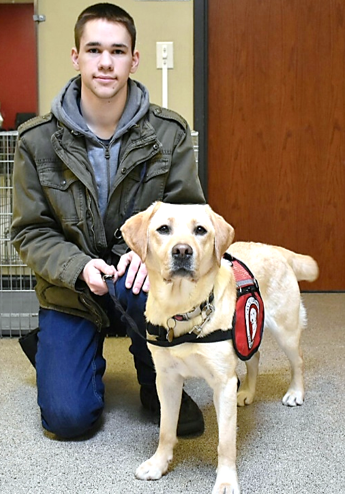Can Do Canines Diabetes Assist Dogs are trained to monitor smells in the air from their human partner for a specific scent that is related to rapidly dropping or low blood sugar levels. If the scent is detected by the dog, they then “alert” the person with diabetes, usually by touching them in a significant way such as pawing or nudging them. The handler then knows to check his or her blood sugar level. As a result, they may need to get something to eat or drink to prevent hypoglycemia.
Besides being taught their life-saving detection skill, our Diabetes Assist Dogs are also often trained to:
- retrieve juice or glucose tabs
- get an emergency phone
- alert another person to come to the aid of their partner
Diabetes Assist Dogs wear a backpack identifying them as an assistance dog. This backpack has pockets where medical information, a sugar source, and emergency contact information can be stored. This provides an extra safety net in case the person with diabetes is unable to get help in time. Anyone finding the person unconscious or acting abnormally would know it may be a medical emergency and know how to get help.
Our dogs are only trained to assist Type 1 diabetics. We do not train our dogs to detect unusual highs, only blood glucose lows (a low is considered anything under 70).

General Criteria for Diabetes Assist Dog Applicants:
- Must be a resident of Minnesota or Wisconsin
- Must have Type 1 diabetes complicated by hypoglycemic unawareness and can provide proof of diagnosis
- Must be physically and financially able to take full responsibility for the dog after certification
- Must be at least 18 years old
- Must not currently own a dog unless applying to owner-train their pet
Click on the image below to watch a video about our Diabetes Assist Teams.




